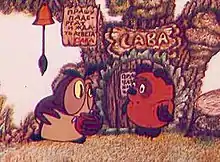| Winnie-the-Pooh and a Busy Day | |
|---|---|
 Image from the film | |
| Directed by | Fyodor Khitruk, Gennady Sokolsky |
| Starring | Vladimir Osenev Yevgeny Leonov Iya Savvina Erast Garin Zinaida Naryshkina |
| Music by | Mieczysław Weinberg |
Release date |
|
Running time | 20 minutes |
| Country | Soviet Union |
| Language | Russian |
Winnie-the-Pooh and a Busy Day (Russian: Винни-Пух и день забот, romanized: Vinni-Pukh i den zabot ⓘ, or Winnie the Pooh and a Day of Troubles in the English dub title) is a 1972 animated film by Soyuzmultfilm, directed by Fyodor Khitruk and Gennady Sokolsky. Based on the book series by A. A. Milne, it is the final part of a trilogy, following Winnie-the-Pooh (1969) and Winnie-the-Pooh Pays a Visit (1971). Twice longer than either of its predecessors,[1] this installment is co-written by Khitruk and Boris Zakhoder, with prototype drawings created by Khitruk and Vladimir Zuikov.
Storyline
Eeyore and Owl make their first appearance in the trilogy, while Winnie-the-Pooh, Piglet, and the narrator all return. (Rabbit appears only in the second installment.)[2][3] Once they learn it's Eeyore's birthday, his friends attempt to mark the occasion.
Cast
- Vladimir Osenev as the narrator.[4]
- Yevgeny Leonov as Winnie-the-Pooh.[4]
- Iya Savvina as Piglet.[4]
- Erast Garin as Eeyore. Garin was the only actor invited at early stages of writing the trilogy – all others were recruited at the recording stage.[4]
- Zinaida Naryshkina as Owl. Although Naryshkina was an experienced actress, Khitruk knew nothing about her before the auditions; he immediately liked her acting and started recording her right at the auditions.[4]
Legacy and awards
In 1976 Khitruk was awarded the USSR State Prize for the Winnie-the-Pooh trilogy.[5] The animation characters, as designed by Khitruk's team, are featured on the 1988 Soviet and 2012 Russian postal stamps; they are permanently painted on a public streetcar running through the Sokolniki Park, and their sculptures are installed in Ramenki District in Moscow.[6]
When Khitruk visited the Disney Studios, Wolfgang Reitherman, the author of Winnie the Pooh and the Blustery Day that won the 1968 Academy Award for Best Animated Short Film, told him that he liked the Soviet version better than his own.[5][7]
References
- ↑ Винни-Пух и день забот. animator.ru
- ↑ Mikhailin, yurii (2005) О зарождении идеи фильма (Interview with Khitruk in Russian). Kinovedcheskie Zapiski, Vol. 73
- ↑ Iten, Oswald (August 8, 2011). Pooh vs. Pukh, a character analysis. Colorful Animation Expressions
- 1 2 3 4 5 Kapkov, Segey (2006). Мастера дураковаляния (Interview with Khitruk in Russian). Kinovedcheskie Zapiski, Vol. 80
- 1 2 Фёдор Хитрук (Fyodor Khitruk). Russian Animated Film Association
- ↑ Винни-Пуху и всем-всем-всем. unmonument.ru
- ↑ Moritz, William (1999) The Spirit Of Genius: Feodor Khitruk. Animation World Magazine
External links